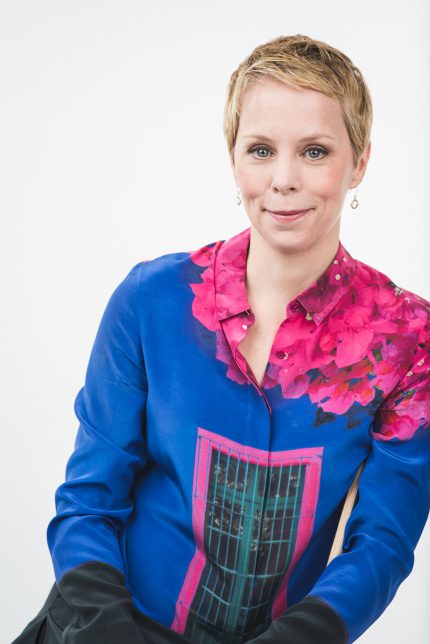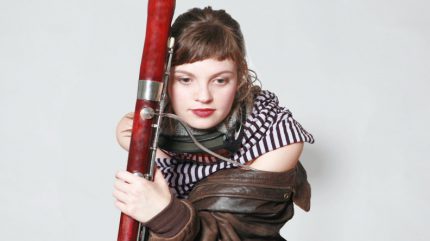Inaugural Ear Taxi Festival to hit cruising speed for new music

This musical spectacular has been a long time coming.
The Ear Taxi Festival, a brand-new, five-day extravaganza of contemporary classical music, which opens Wednesday and runs through October 10 in downtown Chicago, celebrates one of Chicago’s best-kept secrets.
During the past decade or so, Chicago has become a mecca for young musicians interested in composing, performing, and producing contemporary chamber music. Today the city has one of the most vibrant contemporary music scenes in the nation, mainly because of the dozens of young artists who have decided to call Chicago home.
Billing itself as “a fearless joyride,” the Ear Taxi Festival will cover a wide swath of astoundingly varied terrain. It will present more than 300 performers, 25 ensembles, works by 70-some composers, including 50 world premieres, plus panel discussions and sound installations. There will be a piece for shadow puppets and musicians and a work that mixes young students from the People’s Music School with the highly polished professionals of the International Contemporary Ensemble. Founded in Chicago in 2001 by a group of Oberlin graduates, ICE is now an internationally acclaimed group based in New York.
The Ear Taxi schedule includes evening performances at the Harris Theater for Music and Dance and at the club Constellation. There will be free, non-stop New Music Marathons from noon to 5 p.m. Saturday and Sunday at the Chicago Cultural Center. The festival closes with the season kickoff concert in the Chicago Symphony Orchestra’s MusicNOW series at the Harris.
“Three years ago I was thinking about the vibrancy here and all these wonderful ensembles and composers,” said Augusta Read Thomas. A former CSO resident composer and currently a professor at the University of Chicago, Thomas spearheaded the idea of the festival and has co-curated its programs with trumpeter Stephen Burns, founder of the Fulcrum Point Ensemble. “The culture [for contemporary music] in Chicago is very strong. People go to each other’s concerts. It’s not campy, like ‘These people don’t like those people.’ It’s really collaborative. People are collaborating across aesthetics. An ensemble might do a piece that’s very ritualistic, and then the next piece is dreamy, a totally different aesthetic. It’s just a really, really nice vibe.”
That vibe, however, hasn’t had much impact yet on Chicago’s broader cultural landscape. The local new music scene, however innovative, is still somewhat hermetic. Chicago Symphony and Lyric Opera audience members who might want to hear new young ensembles have trouble finding who they are and where and when they’re performing. There are few easily accessible listings of upcoming contemporary concerts. Unlike theaters that can benefit from repeat performances and good word of mouth, contemporary concerts are usually one-offs.
But Chicago’s now-fabled theater scene started in the 1960s with similarly scattered roots, planted by small groups of young actors, directors and playwrights drawn by Chicago’s (then) cheap rent and collaborative spirit. It was time, Thomas decided, to start getting out the word that something equally engaging was bubbling up among the city’s young musicians and composers.
“I thought maybe I should put on my citizenship hat and just create a massive festival. At that minute,” she said with a weary laugh, “I should have just shot myself in the head.” Even with the expert help of Reba Cafarelli, an experienced music administrator who manages the day-to-day details, planning a massive festival can bring massive headaches.
But Thomas and Burns have persevered, guided by a few iron-clad goals.
One was to showcase groups at the city’s leading downtown chamber venue, the Harris Theater.
“Some of these groups have never played Harris,” said Thomas. “The Spektral Quartet has never had a solo show there. Third Coast Percussion, Ensemble Dal Niente never had one, even though they’re big and famous and have CDs and have been touring for 10 years.”
Thomas is also proud that with Ear Taxi, “there’s no house style. There’s going to be everything, an incredible plethora of voices and styles, syntaxes, languages, aesthetic leanings, historical traditions. My whole image with the Ear Taxi Festival was Beethoven’s head, a bust of Beethoven and out of his ears come all sorts of little taxi rides. You’re going to come on a lot of little taxi rides, and every one of them will be different.”
Two of the festival’s musical cabbies are Katherine Young and Kyle Vegter, young Chicago-based composers who have written new works commissioned by the CSO’s MusicNOW series. Young’s octet, where the moss glows, is composed for violin, viola, cello, clarinet, bassoon, tuba, electric guitar and percussion (with amplification and electronics). Vegter’s Monday or Tuesday, inspired by a prose poem by Virginia Woolf, is composed for clarinet, bass clarinet, cello, percussion and piano with shadow puppetry designed by Chicago-based Manual Cinema. Both will receive their world premieres at MusicNOW’s October 10 concert in the Harris Theater.
Young, in her mid-30s, and Vegter, 29, are typical of the musicians creating Chicago’s vibrant contemporary music community. Neither is a Chicago native and both are pushing aesthetic boundaries.
Young, a bassoonist as well as composer, was born in Michigan and grew up in various cities in Mississippi, Texas, and Georgia. She is finishing her doctorate at Northwestern. Improvisation is central to her music, and she collaborates closely with other musicians on her compositions.
“That’s always been how I approached things,” she said. “Because I started out as a performer, I always figured, ‘Well, when I’m writing, I should talk to the performers.’ It’s not rocket science. It always seemed sort of obvious to me that performers are the experts on their instruments.”
Friends encouraged Young to move to Chicago after she earned degrees at Oberlin and Wesleyan University.
“I had a really good friend who had moved here,” said Young. “She said, ‘I’m finding all these people and they’re doing really interesting music; you should definitely come here.’ So I and some other friends all migrated together. It was not too expensive and I was able to find work, so it all worked out.”
Vegter is a founder and managing artistic director of Manual Cinema, a performance collective formed in 2010 whose haunting shadow puppetry has been seen in venues from New York’s Metropolitan Museum to the La Monnaie-DeMunt opera house in Brussels. Earlier this month he was putting finishing touches on shows that will be seen in Beijing and Shanghai later this year. Manual Cinema uses vintage overhead projectors, actors, puppets and live-feed cameras in its shows and occupies 4,600 square feet of studio space in a low-slung building just steps from the 606 trail in the Logan Square neighborhood.
“Manual Cinema is a dream collaboration for me,” Vegter said. “I started in music playing in bands. Also, I started out being much more interested in literature and poetry and writing rather than music. This job, doing sound and music for a puppetry company, allows both. I get to write stories and be involved in the crafting of story-telling, and I also get to make really intricate sound design and music. Because we don’t use dialogue, all of the story-telling is told using images and sound and music. So I feel like sound and music play a much more important role that in most theater or film.”
Growing up in Florida, Vegter was entranced by Chicago’s alternative rock scene. Plans to attend the University of Chicago fell through, but he traveled to the city regularly to visit friends at the U of C. After earning his undergraduate degree at the University of Florida, he moved to Chicago permanently.
The city turned out to be ideal for launching a genre-bending venture like Manual Cinema.
“It’s a great place to start something,” said Vegter, looking around the company’s bright, airy studios. “Rent is cheap. It would be insanely expensive for a small company to have this kind of studio in New York. I don’t think we could have started in any other city.”
Chicago’s collaborative vibe also helps.
“People here are looking to collaborate,” said Vegter. “When you go to New York and LA–and we’ve worked in New York a fair amount at this point–there are so many people vying for the same creative jobs that everybody’s just a little on edge, just a little cutthroat in the way they work together. You just don’t get that here. Here the stakes are lower, which is actually important artistically. You can be freer, and you can move faster.”
Thomas hopes the Ear Taxi Festival will speed up Chicago’s appreciation of the creative energy that’s has transformed its contemporary music scene.
“I love this art form,” she said. “I hope Ear Taxi will have a ripple effect.”
The Ear Taxi Festival opens Wednesday and runs through October 10. For a complete list of events and program details, go to eartaxifestival.com.
Posted in Articles



